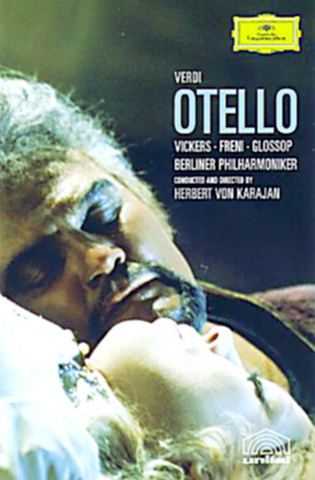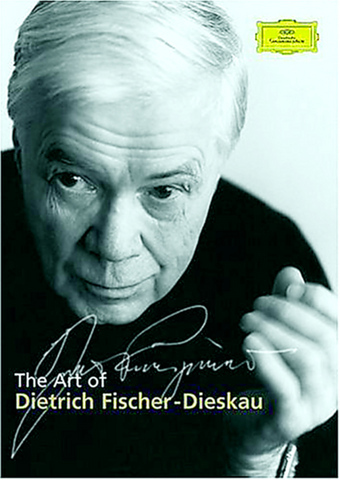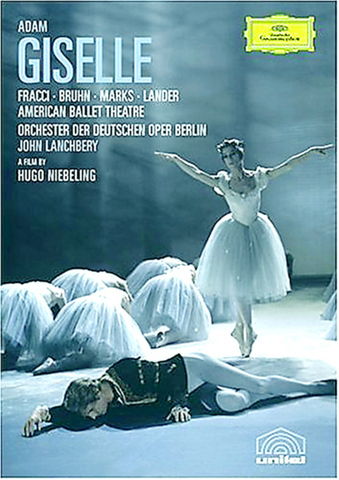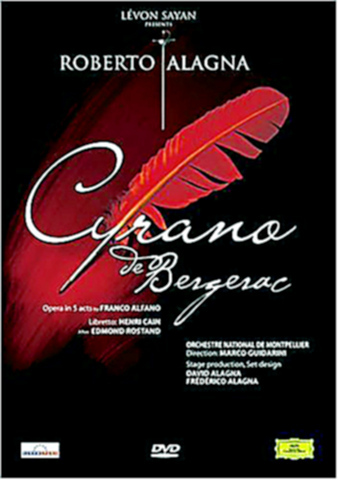Franco Alfano was until recently only known as the composer who completed Giacomo Puccini's unfinished opera Turandot after his death in 1924. In the last two years, however, his own Cyrano de Bergerac (written in French, 1935; Italian version 1936) has been revived, first at the Montpellier Festival with Roberto Alagna in July 2003, and subsequently elsewhere. This ground-breaking Montpellier production is now issued on a very acceptable DVD.
In a bonus section of backstage interviews the opinion is expressed that the opera slid into oblivion on account of the shortcomings of the Italian translation. What we have here is the opera in its original French, the language of the celebrated verse play by Edmond Rostand (1897) of which it is a musical version.
The result is surprisingly enjoyable. What you see is essentially the stage production, but it's full of color and energy, and the principals all deliver creditable performances. Alagna is far more sympathetic on-stage than in concert, and plays Cyrano with credibility and vocal charm. Nathalie Manfrino is a youthful and touching Roxane, while Richard Troxell makes a charismatic Christian. The traditional-style sets and stage production (by Alagna's two brothers) are of a quite high standard, and effective once you accept that this is a performance rather than a film in its own right. Subtitles are in English and French only.

This having been said, it's impossible to prefer this operatic version to Jean-Paul Rappeneau's film of the original play with Gerard Depardieu (1989). With its inspired English captions, in verse, by the novelist Anthony Burgess, this remains an unassailable
classic. Rostand's play, routinely maligned by purists (such as George Steiner in The Death of Tragedy 1961), is there revealed as the masterpiece it is. It is arguable that the main reason for the neglect of Alfano's opera has been that the verse play had such power and beauty that there was little orchestral music and singing voices could add to it (though Rappeneau's film did benefit from some fine music of its own).
Meanwhile, Deutsche Grammophon continues to unveil further treasures culled from its acquisition of the Unitel catalogue. Of great interest among these is Otello with Jon Vickers, dating from 1974. It's a film not only directed as well as conducted by Herbert von Karajan, but with the maestro actually appearing briefly on screen as one of the drunken revelers in Act 1. Mirella Freni is a traditional Desdemona, while Peter Glossop offers an especially strong Iago, albeit blond and elegantly coiffeured in contrast to the usual darkly saturnine presence. The chorus's acting seems dated and artificial now, but this is a great performance nonetheless.

Most music-lovers will agree that this DVD can't compete with the Metropolitan Opera's magnificent version with Placido Domingo, Renee Fleming and James Morris [Deutsche Grammophon 073 092-9, reviewed in Taipei Times 28 March 2004]. But Vickers was the acknowledged world leader in this role before the ascendancy of Domingo, and his many followers will want to see this version on his account alone. It is only marginally less powerful than his performance on CD with Leonie Rysanek and Tito Gobbi (available from Japan on BVCC-8871-72). The Berlin Philharmonic under Karajan play with titanic violence and brilliance, but it's Vickers, with his Celtic jaw and heroic tone, who remains the presence that validates this re-issue in DVD format. Subtitles are available in six languages, including English and Chinese.
Ballet-lovers also benefit from this re-issue of old classics, for example in a famous Giselle from the American Ballet Theater dating back to 1969. In this 90-minute film, directed by Hugo Niebeling, based on that production, Giselle is danced by Italian Carla Fracci and her male opposite, Albrecht, by the Dane Erik Bruhn.
The result is basically a reconstruction of a stage performance, but with some naturalistic outdoor effects added, and much use made of inter-cut film shots. The problem with it is that the anti-hero Hilarion (Bruce Marks) is an infinitely more sympathetic figure than the clean-cut Albrecht with his disdainful looks and side-parting. Hilarion's death was for me the best dance sequence in the piece -- but true ballet aficionados will no doubt appreciate far more.

The Art of Dietrich Fischer-Dieskau is a 2-DVD set full of material that is both historic and wonderful in its own right. Fischer-Dieskau was the most famous German baritone of his generation, and these discs are offered as a testament to his 45-year long career in both lied and opera -- three hours' worth in all. There are also two ten-minute interviews with Fischer-Dieskau, now 80, one on each DVD. Subtitle languages include Chinese.
There are many rarities here -- extracts from Il Tabarro sung in German and from a black-and-white film of Don Giovanni dating from 1961, much Richard Strauss, and an extract from the 12-tone opera Lear by Aribert Reimann. On the lieder disc there are songs by Beethoven, Schubert, Schumann, Brahms and Strauss, plus Mahler's complete Kindertotenlieder. This last piece, back-lit and shot in funereal monochrome, is astonishingly atmospheric and the most memorable item of any of this month's releases.


On April 26, The Lancet published a letter from two doctors at Taichung-based China Medical University Hospital (CMUH) warning that “Taiwan’s Health Care System is on the Brink of Collapse.” The authors said that “Years of policy inaction and mismanagement of resources have led to the National Health Insurance system operating under unsustainable conditions.” The pushback was immediate. Errors in the paper were quickly identified and publicized, to discredit the authors (the hospital apologized). CNA reported that CMUH said the letter described Taiwan in 2021 as having 62 nurses per 10,000 people, when the correct number was 78 nurses per 10,000

As we live longer, our risk of cognitive impairment is increasing. How can we delay the onset of symptoms? Do we have to give up every indulgence or can small changes make a difference? We asked neurologists for tips on how to keep our brains healthy for life. TAKE CARE OF YOUR HEALTH “All of the sensible things that apply to bodily health apply to brain health,” says Suzanne O’Sullivan, a consultant in neurology at the National Hospital for Neurology and Neurosurgery in London, and the author of The Age of Diagnosis. “When you’re 20, you can get away with absolute

May 5 to May 11 What started out as friction between Taiwanese students at Taichung First High School and a Japanese head cook escalated dramatically over the first two weeks of May 1927. It began on April 30 when the cook’s wife knew that lotus starch used in that night’s dinner had rat feces in it, but failed to inform staff until the meal was already prepared. The students believed that her silence was intentional, and filed a complaint. The school’s Japanese administrators sided with the cook’s family, dismissing the students as troublemakers and clamping down on their freedoms — with

As Donald Trump’s executive order in March led to the shuttering of Voice of America (VOA) — the global broadcaster whose roots date back to the fight against Nazi propaganda — he quickly attracted support from figures not used to aligning themselves with any US administration. Trump had ordered the US Agency for Global Media, the federal agency that funds VOA and other groups promoting independent journalism overseas, to be “eliminated to the maximum extent consistent with applicable law.” The decision suddenly halted programming in 49 languages to more than 425 million people. In Moscow, Margarita Simonyan, the hardline editor-in-chief of the